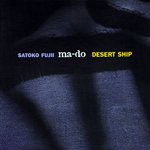Home » Jazz Articles » Album Review » Satoko Fujii Ma-Do: Desert Ship
Satoko Fujii Ma-Do: Desert Ship
More heavily notated than some of Fujii's work, these labyrinthine compositions rely on a rigorous blend of intricate structure and unfettered freedom. Offsetting the quartet's predilection for massed sonorities, Fujii regularly arranges them into smaller groupings, balancing density with space, endowing her dynamic compositions with introspective breathing room.
Having developed a virtually telepathic rapport with Fujii over the years, trumpeter Natsuki Tamura (Fujii's husband), revels in the sonic extremes proffered by these episodic pieces. From stratospheric altissimo and banshee-like howls to Milesian sobriety, he spans every range of his horn, exuding a fearless adventurousness that inspires bassist Norikatsu Koreyasu and drummer Akira Horikoshi, who share in the ensemble's highly conversational dynamic and provide far more than mere support.
Koreyasu and Horikoshi's spirited interplay is both congenial and combative, ably demonstrated on the turbulent dialogue that introduces "Sunset In The Desert." Horikoshi's penchant for kinetic force is boundless, but is tempered by a supple touch. A sterling bassist, Koreyasu's expressive arco abilities are especially noteworthy. Articulating bowed phrases with horn-like inflection, his instrument sings with vocalized pathos, revealed at length on "Nile River."
From the coruscating fury of "February-Locomotive-February" to the aleatoric impressionism of the title track, Fujii's tunes are refreshingly unpredictable, embodying their own personalized sense of unorthodox formalism, which her sidemen navigate with impressively organic logic. The romantic musings she juxtaposes over the roiling drum and bass assault of "Sunset In The Desert" and the languid bittersweet piano refrain that underscores Koreyasu's boisterous pizzicato solo on "Ripple Mark" are two examples of her mercurial aesthetic. Though engaging in an array of probing excursions herself—like the circuitous spree she unleashes on the fragmentary "Pluto," or the gamelan-flavored prepared piano filigrees that haunt the dreamy "While You Were Sleeping"—Fujii refrains from monopolizing the spotlight, allowing ample solo space for her sidemen.
Lending credence to their titles, "Capillaries" splinters in multiple directions, its two minute duration and frenzied pace the perfect contrast to the closing "Vapour Trail." Ending the set with a respite of heartbreaking, introspective pianism, this dulcet excursion serves as the antidote to the previous barrage—a cathartic and cleansing coda.
A wide-ranging talent whose efforts vary from intimate duos to big bands, Fujii's abilities cannot be encapsulated in one line-up, let alone a single album. Desert Ship offers a wonderful cross-section of her abilities as an improviser and, especially, as a composer.
Track Listing
February-Locomotive-February; Desert Ship; Nile River; Ripple Mark; Sunset In The Desert; Pluto; While You Were Sleeping; Capillaries; Vapour Trail.
Personnel
Satoko Fujii
pianoSatoko Fujii: piano; Natsuki Tamura: trumpet; Norikatsu Koreyasu: bass; Akira Horikoshi: drums.
Album information
Title: Desert Ship | Year Released: 2010 | Record Label: Not Two Records
< Previous
Part 8 - Knitting Factory rolls out F...
Next >
The Spoiled Tree
Comments
Tags
For the Love of Jazz
 All About Jazz has been a pillar of jazz since 1995, championing it as an art form and, more importantly, supporting the musicians who create it. Our enduring commitment has made "AAJ" one of the most culturally important websites of its kind, read by hundreds of thousands of fans, musicians and industry figures every month.
All About Jazz has been a pillar of jazz since 1995, championing it as an art form and, more importantly, supporting the musicians who create it. Our enduring commitment has made "AAJ" one of the most culturally important websites of its kind, read by hundreds of thousands of fans, musicians and industry figures every month.



















